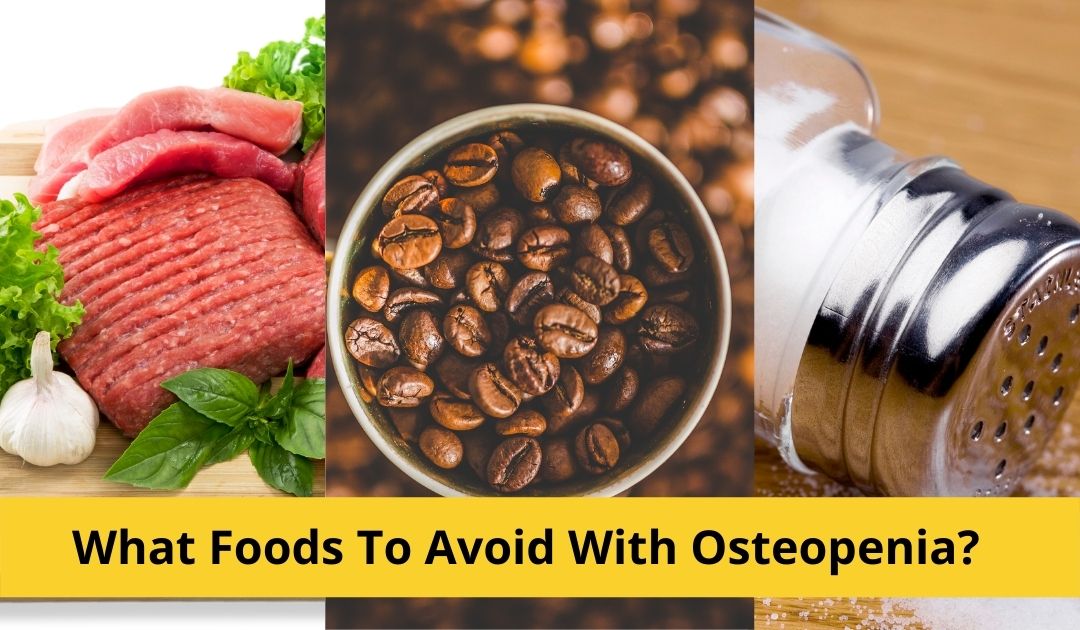Over 8.9 million fractures occur each year due to osteoporosis worldwide. This works out to about one osteoporotic fracture every three seconds. Furthermore, your diet may increase your risk of osteoporosis. Osteoporosis is a condition characterized by the loss of bone tissue and the weakening of the bones that affects around 10 million Americans. Broken bones are a common complication of osteoporosis, which can cause health issues. However, broken bones and gradual bone degeneration can be reduced with proper treatment. Learn more about what makes a good osteoporosis diet, what foods to avoid osteoporosis, and how dietary adjustments might help alleviate osteoporosis symptoms.
Foods To Avoid with Osteoporosis
Table Salt
Calcium is an essential mineral for bone health and strength, so people with osteoporosis are advised to increase their calcium consumption. In addition, eggs, milk, and leafy greens promote healthy bones and muscles. However, if you want your calcium intake to be adequate, you must simultaneously lower your salt intake.
Sodium which is present in table salt promotes calcium excretion from the body. Salty snacks (chips and crackers) and processed foods with additional salts should be avoided (including canned vegetables and soups). Experiment using different spices instead of salt to add flavour to your food.
Non-Alcoholic Drinks
Caffeinated soft drinks, such as colas, have been linked to bone loss, according to research thus far. However, scientists are still trying to figure out why and how soda use might harm bones. Some believe that phosphorus, present in sodas, result in bone deterioration over time. Others, however, think that phosphorus in soft drinks will not affect it.
Sugary, caffeinated sodas are devoid of critical nutrients and may be harmful to your health. Instead, drink water or milk whenever possible.
Red Meat
Protein is vital for overall health and strength, and meat remains one of the most common dietary protein sources in many Western nations. However, replacing a few meals of red meat with dairy, nut, or soybean proteins may help reduce osteoporosis symptoms. The body removes calcium from the bones and releases it into the blood system to deal with the surge of sulfur-containing amino acids found in meat protein. Because people with osteoporosis require all of the calcium they can get, it's advised to cut back on red meat and improve your intake of nuts and beans.
View More: 7 Amazing Benefits Of Kalay Chanay Roasted Grams
Caffeine
Caffeine depletes the strength of bones by removing calcium. By taking 100 milligrams of caffeine, you lose 6 milligrams of calcium from bones. That's not as bad as losing salt, but it's still a matter of concern. When a lady doesn't receive enough calcium during the day, to begin with, caffeine becomes a problem. The good news is that lowering caffeine intake to 300 mg per day and taking enough calcium will likely reduce any caffeine-related losses.
Coffee is a primary source of caffeine. For instance, 320 milligrams can be found in a 16-ounce cup of coffee. Caffeine levels in high-caffeine sodas can reach 80 mg per can or higher.
Foods For Strong Bones And Muscles
Our daily food intake can be divided into alkaline and acidic. The foods listed below may assist in reversing bone loss and increasing calcium absorption in the bones:
- Bone-in sardines
- Yoghurt with low fat
- Tofu that has been treated with calcium salts
- Milk (if lactose intolerant, use soy milk)
- Ricotta cheese
- Collard greens
- Almonds
- Dried figs
- Pinto beans
- Navy beans
- Calcium-fortified orange juice
- Broccoli
Although these foods are high in calcium, your body requires Vitamin D to absorb them. Sunlight and foods high in the sunshine vitamin can provide enough Vitamin D. To help your body generate Vitamin D, spend nearly 10 minutes in the sun with most of your skin exposed, preferably in the early mornings. This is where participating in outside activities might help. To avoid a vitamin D shortage throughout the winter, eat foods that are high in vitamin D. Cheese, egg yolks, orange juice, and vitamin D-fortified cereals should all be included in your diet.
Finally
If a good diet and exercise routine are not maintained, osteopenia reduces bone mass, which can progress to osteoporosis. If you've been diagnosed with osteopenia, talk to a fitness professional about how to strengthen your bones without injuring yourself. Running, walking, running up the stairs, weight-bearing activities, riding, squats with weight, push-ups, and yoga are the finest exercises for increasing bone mass and strengthening your bones.



